Machinist
You enjoy numbers and data, modern technology and working with computers as well as analytical and logical thinking? Then machinist could be the right apprenticeship for you.
Machinists are responsible for the production of precision components made of metals. They use cutting processes such as turning, milling, drilling or grinding. As a rule, they use CNC (Computerized Numerical Control) machine tools. The computer-controlled machine tools are set up and monitored by the machinists for the various jobs. During your three and a half year apprenticeship you will take on responsibility from the very beginning and get to know all facets of metalworking.
Luca Segedi graduated from the Ostvest Vocational College in 2021 with a technical baccalaureate in metal technology. Here he spent two years gaining professional knowledge in the field of machine/automation technology. Because he already learned how to use computer-controlled machine tools at the vocational college, his hand movements and his work on the machines in VULKAN's training workshop already seem very routine. Before he started his training as a machinist at VULKAN in August 2021, he first completed a two-week internship in the production department. "This helps a future apprentice immensely to gain an insight into the profession, to get to know the processes and the people", says Luca. "And it's also important for the trainers to know whether an applicant will fit into the team", he adds.
The Motivation
It became clear to him during his time at the vocational college that he definitely wanted to learn this profession. "I'm fascinated by working with CNC machines (CNC = Computerized Numerical Control) and working with hairline precision. I like to create something myself, find it exciting how a block of iron ends up becoming something that is important and useful", he describes. "The technical progress, the different ways of achieving something - all of that has cought me", he reports with enthusiasm.
The Tasks at Work
A typical workday for Luca starts at 6 a.m. and ends at 2 p.m.. At around 10 a.m., he takes a half-hour break together with his colleagues. The budding machinist takes on a wide variety of tasks as they arise, starting with assembly work, metalwork such as filing, sawing and drilling, and metal-cutting activities such as turning and milling, the weekly cooling lubricant monitoring, and programming the CNC machines and their operation. The apprentices pass through various departments during their training, and are deployed in mechanical production, vulcanization, assembly and other areas, for example. Luca most recently worked in testing and tool dispensing. "The different work locations help to get to know the overall operation and to understand the path of individual parts all the way to shipment to the customer", he reports. Special experiences that he remembers from his first year of training were, on the one hand, the installation of a new machine and the trade show appearances in which he participated. For example, he helped set up everything on the stand at the Bochum career information fair and informed students about his apprenticeship. "Those were real highlights for me", he says.
The School-Based Training
In addition to their work in the company, trainees in the cutting machine operator apprenticeship attend the Technical Vocational School 1 in Bochum once or twice a week. The theoretical content taught here is divided into different learning areas, such as manual machining, filing, sawing, chiseling, drilling, technical drawings or machining, conventional turning/milling and CNC-controlled machine tools. Luca is most enthusiastic about the control technology learning field at school. In general, however, he prefers practical work to theory. "I prefer to get stuck in and do things myself", he admits. This is of course also one of the reasons why he is learning this profession.
Why did he choose VULKAN as his training company? During his time at the vocational college, he was already on the lookout for training companies in the vicinity that provide training as a machinist. Family and friends had advised him to choose a larger company - partly because of job security, but also because of the opportunities. "There aren't many companies nearby that work with so many different machines and where you can gain such a wide range of practical experience during your training", he explains. And practical experience is so important for a later career, he adds. What will Luca's career look like after his training? "First of all, of course, I hope that I will be taken on after the training and can continue to work at VULKAN", he says. And then he would like to eventually saddle up for his technician or master's degree or possibly even an evening course of study in mechanical engineering technology. We are keeping our fingers crossed for him.
Warehouse Logistics Specialist
Are you interested in administrative and organizational tasks and do you enjoy doing things yourself? Then warehouse logistics specialist could be the right job for you.
Warehouse logistics specialists work, among other things, in goods receiving, in the high-bay warehouse/raw materials warehouse and in shipping. Their tasks include, for example, unloading delivery vehicles and checking goods for identity, quantity and quality, picking orders for assembly/manufacturing and working with the SAP merchandise management system, as well as packing goods and loading and stowing shipments. During your three-year apprenticeship, you will take on responsibility right from the start. You will get to know all training-relevant areas in our company and will be directly involved in our daily business.
Field Report: The Management of Incoming and Outgoing Goods
Shaber Banai is 25 years old and in the 3rd year of his apprenticeship as a warehouse logistics specialist at VULKAN. What does a warehouse logistics specialist actually do and what does the day-to-day work of an apprentice at VULKAN look like?
Shaber Banai fled Afghanistan in 2015. He finished school in Germany in 2021 with a vocational baccalaureate and has already worked in the warehouse at UPS in the meantime.
The Choice of Training Occupation and Company
As he liked the varied, physical work in logistics, he applied for an apprenticeship as a warehouse logistics specialist at VULKAN in 2022. “I already knew a few people who had done an apprenticeship here and loved it,” he says. And as he lives in Herne-Sodingen, the short commute also played a role in choosing his current training company.
The Application Process
About two weeks after his written application, Shaber Banai received an invitation to an interview and passed the recruitment test with 95 percent. His existing work experience played into his hands so that his application process went quickly and smoothly. “The training coordinator at the time then asked me whether I could imagine starting at VULKAN on August 1 and I accepted immediately,” says the trainee.
The In-Company Training
During his training, he has already visited various stations, such as the incoming goods department, the high-bay warehouse and the raw parts warehouse. He has also gained an insight into operating technology and the warehouse. “Getting to know different areas is very varied and gives you an overall view of the operational processes,” says Shaber Banai. The departmental assignments usually last around four months. During this time, he has already seen a lot of incoming and outgoing goods. Unpacking parcels, for example, is one of the daily tasks in incoming goods. The goods are checked and later booked and forwarded to the relevant departments in the company. Working with the SAP merchandise management system is just as much a part of his day-to-day work as working with stacker cranes, loading and stowing shipments and processing shipping and accompanying documents. During his apprenticeship, he has already stood in for colleagues who were absent due to illness or vacation on several occasions. “I can already fully participate here and no longer feel like an apprentice, but like a fully-fledged team member,” says the budding warehouse logistics specialist happily. His trainers have already given him a lot of confidence after a short induction period: “I receive orders that I can process independently,” says the 25-year-old.
The School-Based Training
In addition to his on-the-job training, Shaber Banai attends the Mulvany vocational college in Herne twice a week. The curriculum includes subjects such as business administration, IT and warehouse logistics as well as sport, religion and politics. The VULKAN trainee is just as committed at school as he is at work. With a current grade point average of 1.3, he has little to worry about when it comes to his final exams next year. Like all other trainees, he receives the appropriate support from his trainers and will work on the exam preparation sheets provided by the school.
The Bottom Line
Shaber Banai enjoys his apprenticeship. “That's why a lot of things are easy for me,” he says. “I like the working environment, the training is wide-ranging. I have nice colleagues and supervisors and there is also a good community among the trainees,” is how he sums up his training at VULKAN. After passing his final exam, he hopes to be offered a permanent position at his training company. We are keeping our fingers crossed for him!
Fact Check: Training as a Warehouse Logistics Specialist at VULKAN
- Up to 1,224 euros training allowance in the third year of training
- 37.5 working hours per week
- 30 days vacation
- Vacation and Christmas bonus
IT Specialist for System Integration
Do you have a good basic technical understanding, are you interested in IT topics and do you have strong initiative and analytical skills? Then an IT specialist for systems integration could be the right job for you.
IT specialists for system integration work in all areas - from client support to printer and network administration to the creation of system documentation. They inform and advise employees on software and hardware issues, develop and support IT systems and make them available to employees. During the three-year apprenticeship you will get to know all facets of system integration.
IT Specialist for Application Development
You have a good basic technical understanding and interest in technical processes and programming techniques? Then an IT specialist for application development could be the right profession for you.
IT specialists for application development are responsible for the administration and further development of existing IT systems. You need an overview of the operational processes in the specialist departments (e.g. sales, purchasing or logistics) and work on various in-house projects. During your three-year apprenticeship, you will take on responsibility from the very beginning and get to know all facets of application development.
The freshly graduated IT specialist got a permanent position as an IT analyst at VULKAN after the shortened apprenticeship. Even as a teenager, he had a high affinity for information technology and has already programmed several games and programs. "I grew up with computers", he says. Before he started his vocational training as an IT specialist for application development at VULKAN, he had studied computer science at the University of Applied Sciences Bochum and the University of Applied Sciences Dortmund first. "Here, however, I lacked practical relevance, everything was very theoretical", says Danisch. So when his mother showed him the job ad from VULKAN, he applied without further ado. "I come from Herne, so VULKAN was naturally a familiar name to me as a large and attractive employer." He found the interview "very relaxed": "There was a pleasant atmosphere", he recalls.
This was followed by a trial day in VULKAN's IT department, where he was already able to get to know his future work area and colleagues. A few days later, he was accepted for the apprenticeship and asked whether he would like to shorten the apprenticeship, which normally lasts three years, to two and a half years.
Proposing His Own Solutions and Supporting Employees
On January 1, 2020, things got underway. His workdays at the company usually began at 7:30 a.m., initially working through emails and keeping an eye out for new tickets from employees who needed IT support. For example, his tasks included assigning new employees the permissions they needed and creating new Sharepoint pages. In the document management software DocuWare, he created workflows and customized forms. Here, right at the beginning of his training, there was a first "moment of success" that he remembers fondly: "In a meeting with my trainer and another employee regarding a form, I made a suggestion that was very well received and implemented exactly as it was", he recounts. "This gave me the feeling right away that I could contribute my own ideas and that they would be taken seriously", says Danisch.
Great Support from the Trainer and Colleagues
"I felt very comfortable right from the start. The atmosphere among each other and the helpfulness of my colleagues were a great help", says the IT specialist. His trainer was a particularly great support to him, offering advice and support at all times. Since the young colleague's apprenticeship years fell in the middle of the Corona period and everyone went into the home office from now on, the training went differently than planned and Oliver Danisch was not able to get to know as many departments as originally planned. "However, my trainer was very supportive during this time, explained everything to me and was always available to answer all my questions", praises Danisch. To prepare for the final exam, he even gave him sample exams and went over the results with him, he says.
The School-Based Training
The VULKAN graduate was taught the required theoretical content at the Technical Vocational School 1 in Bochum. Vocational school classes were held once or twice a week. In addition to the usual school subjects such as German, English, sports and religion, the schedule included vocational subjects such as business, information technology and application development. The latter was of course Oliver Danisch's hobbyhorse, as he was able to program here.
The Graduate's Conclusion
In general, he really enjoyed his training period, learning how to use power apps and grasping the interrelationships within the company. He enjoyed seeing how all the systems worked together and that everything harmonized well. He also harmonized with his colleagues: "We're like one big family here", he enthuses. Even after completing his training, Olver Danisch would like to continue his education. He is toying with the idea of obtaining his training license himself or possibly taking up evening studies again.
From the perspective of a recent graduate, what do apprentices need to bring to the table? "In addition to a basic technical understanding and a certain interest in technical processes and programming techniques, trainees in this profession should definitely be team players and communicative", says Danisch. “You deal with people a lot and are a problem solver in a way.”
Industrial Mechanic
You have a talent for craftsmanship and a technical understanding as well as a good knowledge of math and physics and a spatial sense of imagination? Then industrial mechanic could be the right profession for you.
Industrial mechanics work in production facilities, workshops and workshops and assemble, maintain and repair technical machinery and equipment. In addition, they manufacture components and assemblies, monitor production processes and analyze malfunctions.
Industrial Clerk
You bring good math, German and English skills as well as a good understanding of commercial contexts and have an interest in economic processes? Then industrial clerk could be the right profession for you.
Industrial clerks work in the purchasing, sales, product management, marketing, finance, accounting or human resources departments of a company. Their activities are varied: they obtain quotations, process orders, organize work processes, book invoices, plan and implement sales promotion and advertising measures, take over personnel planning, payroll accounting or recruiting, or take care of customer contacts and negotiations. During the three-year apprenticeship you will get to know all areas of VULKAN relevant to training and will be directly involved in our daily business.
Pleasant and Relaxed Atmosphere
Here, she was met by her current trainer and another trainee. "Although I had prepared well for the interview in advance and had informed myself about VULKAN, I was very nervous at first", recalls the future industrial clerk. "However, there was a very pleasant and relaxed atmosphere, so that the excitement quickly faded. I felt in good hands right from the start", says Fatma Erdem. The young woman was able to convince in her interview and began her training at VULKAN in August 2020. She will shorten her training to two and a half years and complete it in January 2023.
Business Processes as a Favorite Subject
In the first and second year of her apprenticeship, she attended Mulvany Berufskolleg in Herne twice a week. In the third year of her apprenticeship, she only attends school once a week. Business processes are both the main subject and her favorite subject here, she says, because you learn so much about all kinds of internal processes. However, data processing, English, management and control, economic and social processes, politics and religion are also on the timetable. Fatma Erdem praises the commitment of her teacher here, who places a lot of emphasis on e-learning and interactive learning: “That was very helpful, especially during the Corona period.”
Working in the Accounting Department
At the training company, prospective industrial clerks go through as many specialist departments as possible, such as sales, contract management, purchasing, accounting and human resources. In addition, the trainees at VULKAN, but also get an insight into manufacturing and assembly. "I think that's good and important to understand the business", says Fatma Erdem. Currently, the 23-year-old is assigned to the accounting department. Here, her typical workday usually starts at 7 a.m. with checking her emails. Then she files the newly arrived incoming invoices in the DocuWare document management software so that she can post them to the appropriate G/L accounts or purchase orders after checking them. She posts cash settlements, assigns various accounts to the respective G/L accounts and cost centers, and supports her colleagues in all work that arises.
Customer Contact at Trade Fairs
She will spend the last months of her training in sales, where she will be offered a permanent position after passing her exams. "Direct customer contact and sales are of particular interest to me. I am a communicative person", says the future industrial clerk. And because she is so communicative and also media-savvy, she now manages the Instagram channel vulkan.azubis, where she can contribute creative ideas. Fatma Erdem has also been and continues to be involved in VULKAN's trade fair appearances. She has already been to Rotterdam Ahoy and, together with other trainees, represented VULKAN as a training company at the career information fair in Bochum. The next big highlight for her is her assignment at SMM, the world's leading trade fair for the maritime industry in Hamburg. "It's great to be there at the trade fair stand myself and to be involved in direct customer contact. “
The VULKAN Total Package
Fatma Erdem is glad that she was able to start her apprenticeship at VULKAN a good two years ago. She feels comfortable in the family-run company and enjoys coming to work. She appreciates the corporate culture and the values that are lived here. Employee parties, vacation pay, Christmas bonuses, the flexitime model and the training and career opportunities on offer round off the overall package for her. Speaking of careers: What should Fatma Erdem do after her training? "I'd like to complete my bachelor's degree in business administration while working", she says.
We wish her every success in realizing her plans!
Technical Product Designer
Do you have manual dexterity and technical understanding, a good knowledge of math, physics and chemistry, and good spatial awareness? Then technical product designer could be the right profession for you.
Product designers design and construct technical products, create 3D CAD data sets and technical documentation, prepare technical documents and perform technical calculations. During your three-and-a-half-year apprenticeship, you will take on responsibility right from the start and get to know all facets of the technical product designer.
Mechatronics Technician
Do you have a talent for craftsmanship, technical understanding and good spatial awareness, and do you have a good knowledge of math, physics and chemistry? Then mechatronics technician could be the right profession for you.
Mechatronics technicians handle the manual and mechanical processing of materials and the assembly of mechanical, electrical and electronic components to form mechatronic systems. You will assemble and disassemble complex components and systems, test them and maintain the systems. During your three-and-a-half-year apprenticeship, you will take on responsibility from the very beginning and get to know all facets of the mechatronics technician.

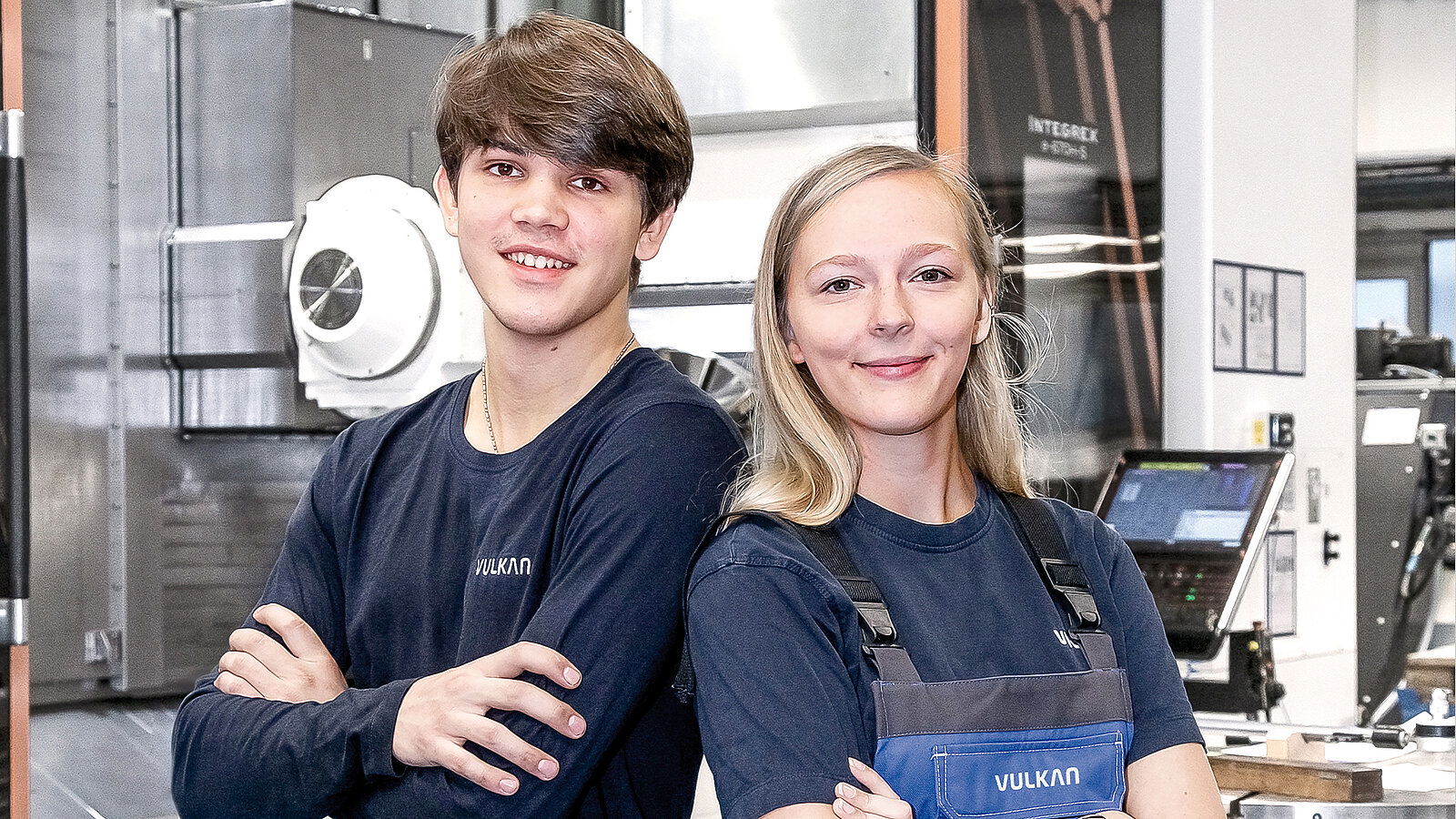




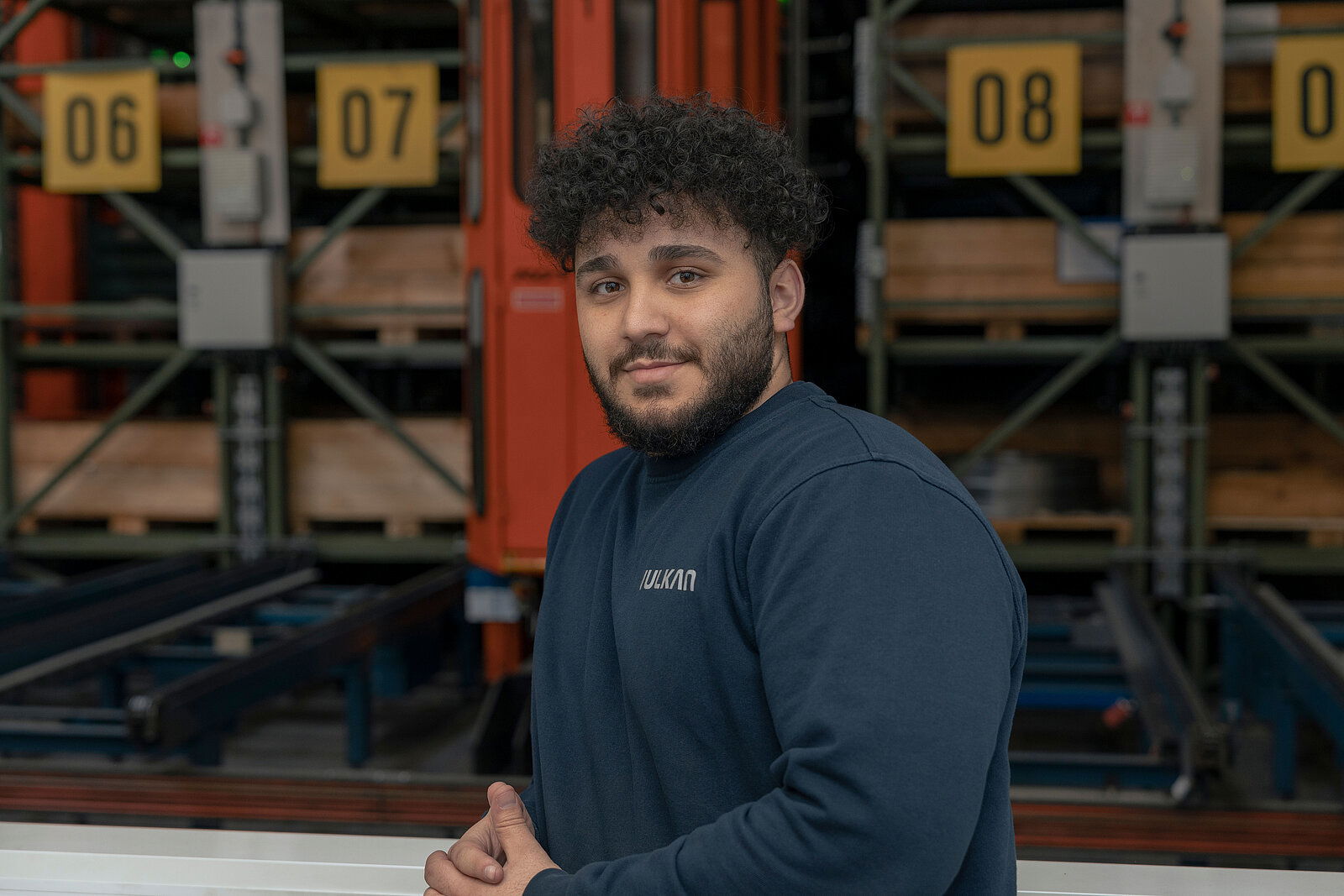
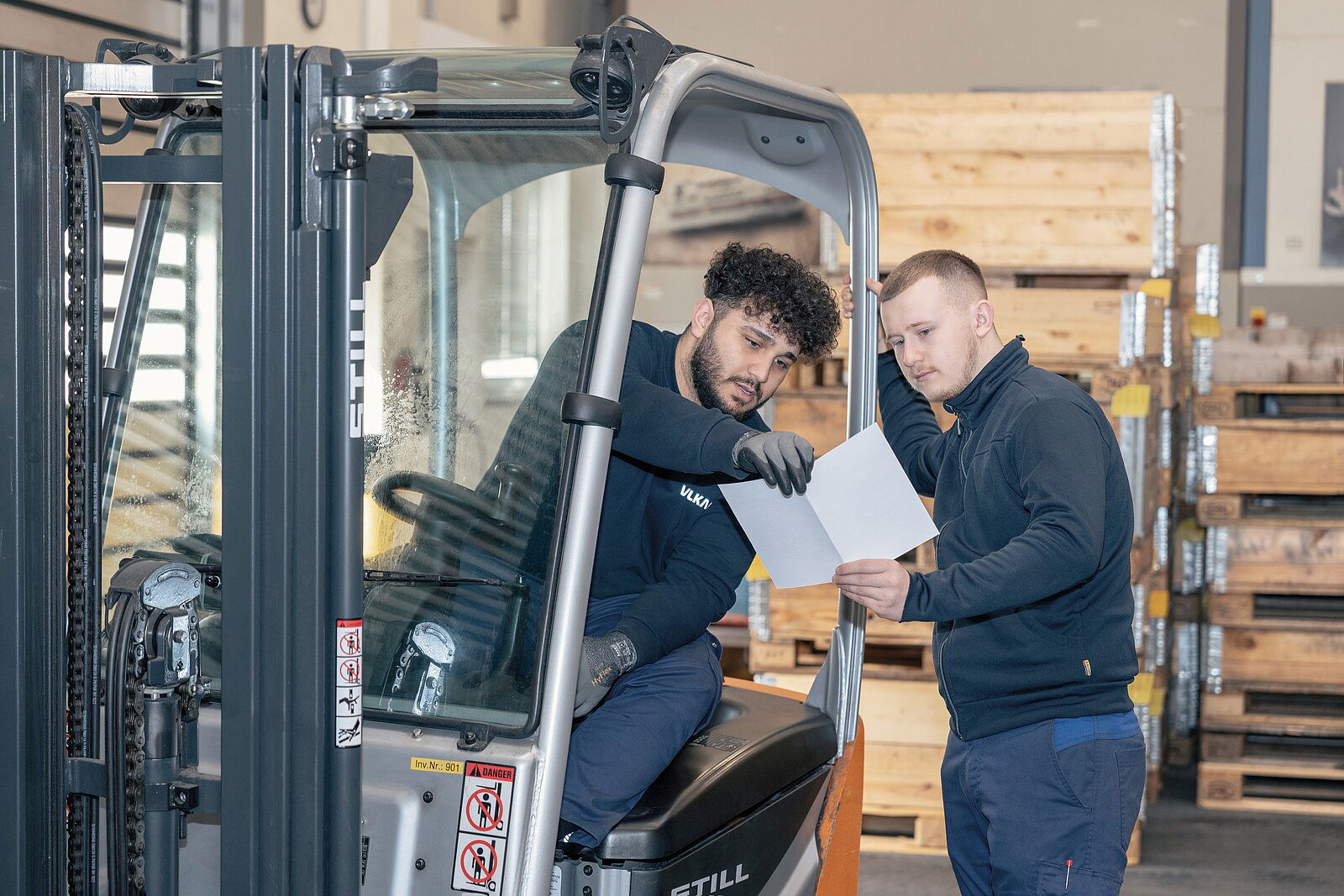
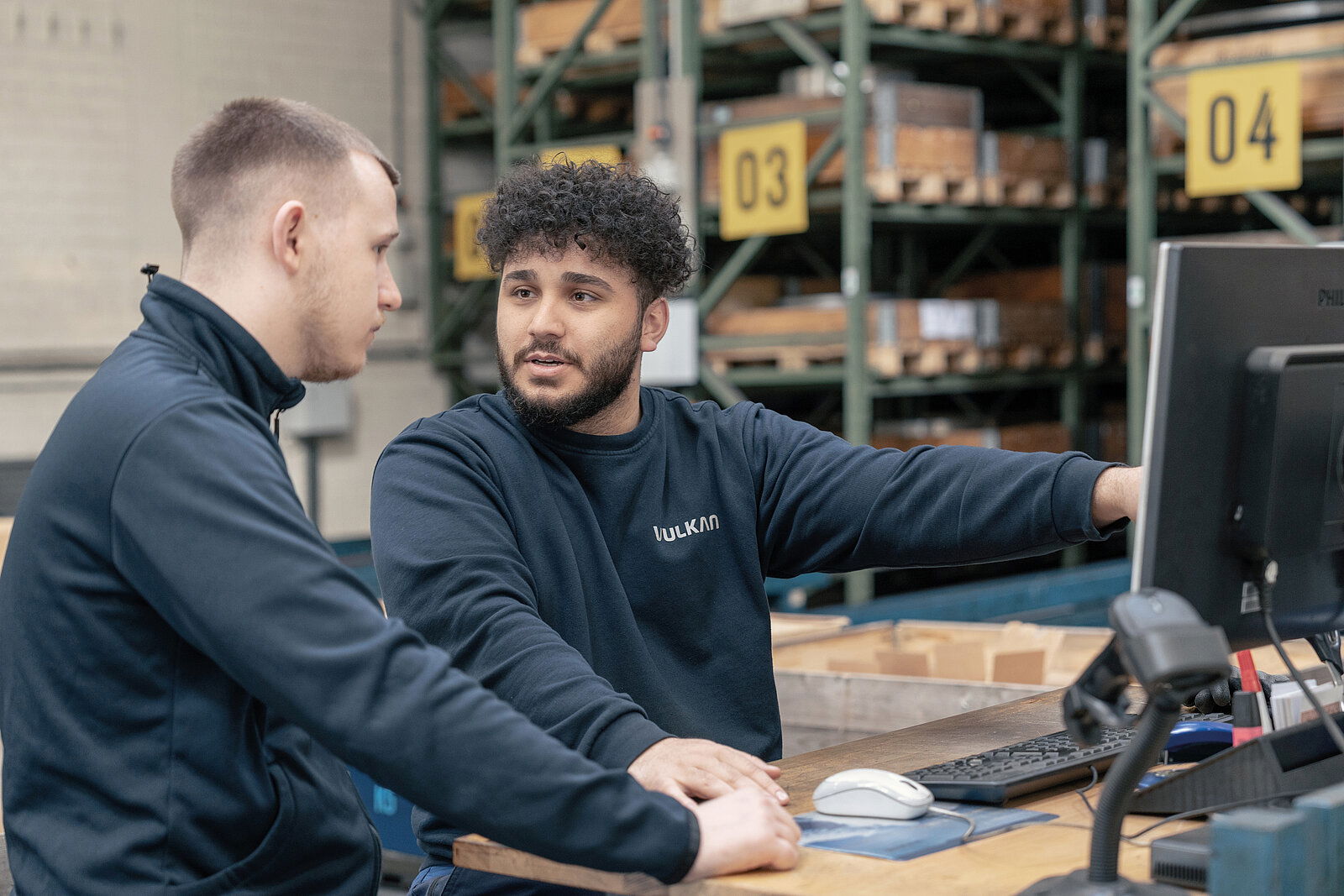






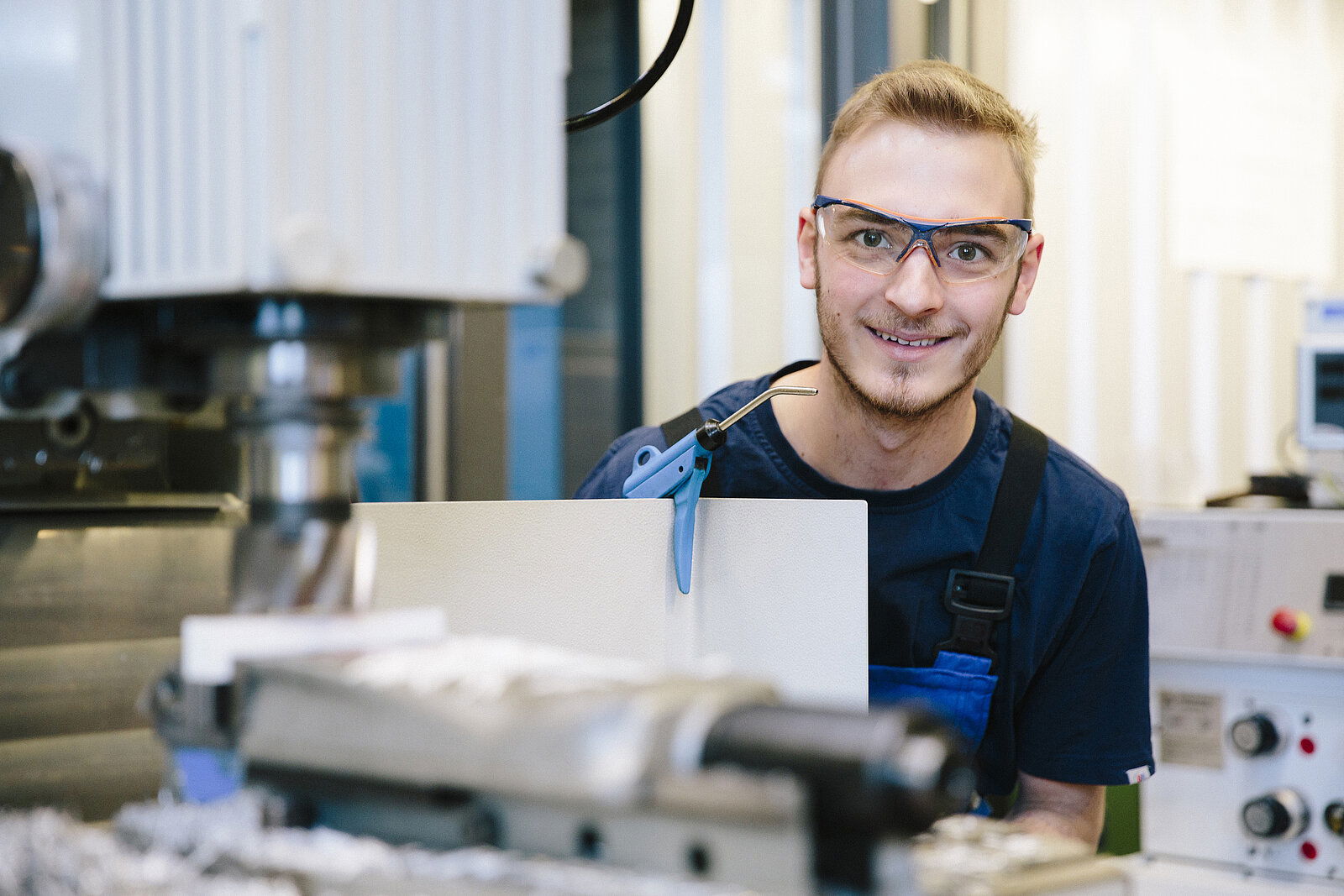
![[Translate to English:] 944101964 Two people are standing and looking at documents in an office. In the background, other people are sitting at a table, engrossed in conversation or work. The office has a modern design with an open ceiling system and pendant lamps.](/fileadmin/_processed_/7/7/csm_944101964_4fedf8d8f7.jpg)




